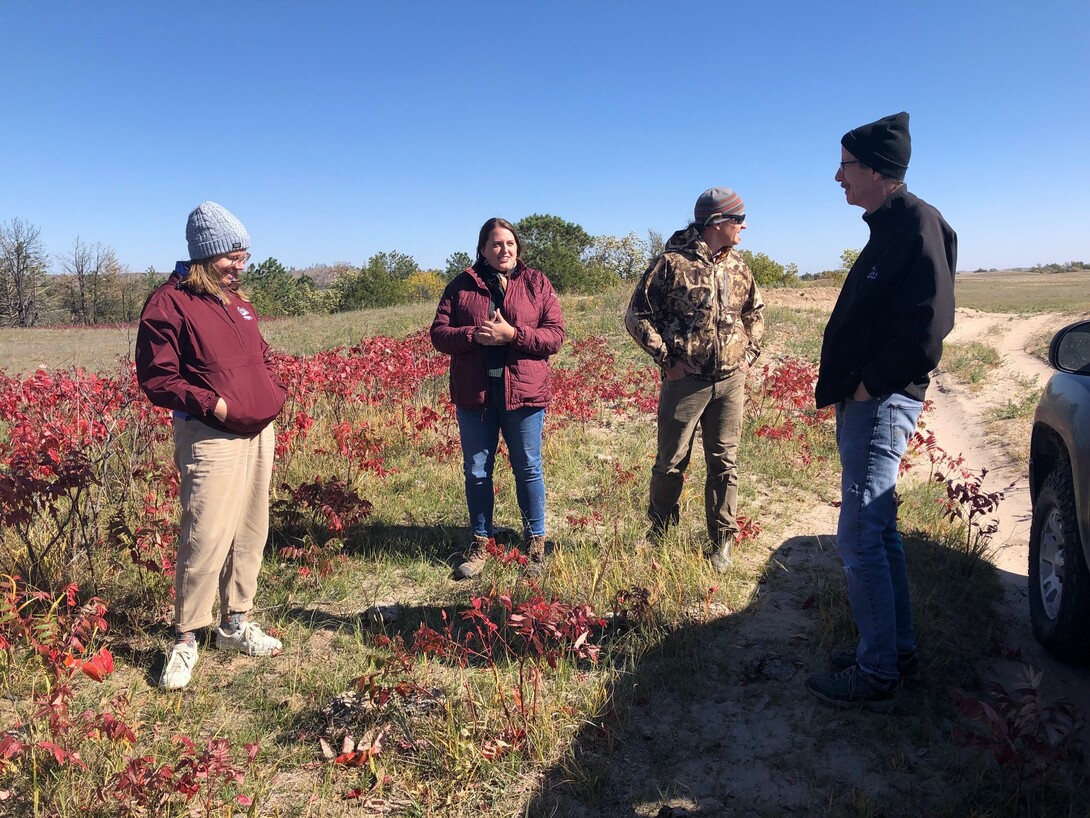
Lincoln, Neb. —The Nebraska-Montana National Science Foundation’s Established Program to Stimulate Competitive Research (EPSCoR) team met in Valentine, Nebraska, Oct. 10-14, for what they termed a “retreat.” The annual meeting proved to be more of a charge forward, with the 17-member team laying out plans for 15 new publications.
“Overall, I feel like we were able to share our individual and collective progresses, build an overarching picture of the synergies and lingering questions emerging from our work, and create a plan to finish the final year of the grant strong and follow through on publications and other work products,” said Brian Chaffin, lead professor from the University of Montana-Missoula.
At the retreat, 12 team members met in person for the first time since 2020 while others attended remotely. The social-ecological team is working on a technology, resilience informatics, that tracks changes on land to help address harmful changes like the spread of invasive plants.
The in-person attendees also toured The Nature Conservancy land to view results of a 2012 wildfire. They hiked nearby and canoed the Niobrara River.
Samantha Hamlin, a postdoctoral researcher at the University of Nebraska-Lincoln, met some team members in person for the first time at the retreat. She had joined the four-year project in August 2021, two years after its start and during the pandemic.
“The most valuable part of the retreat for me was being able to finally be in the same room with people to brainstorm research and new collaborations,” she said. “One of the best parts about doing research for me is collaboration with other people. Talking with people, sharing research interests, brainstorming a new collaboration--all of this is extremely energizing for me and creates more excitement for my work.”
She had adjusted to the remote work but said she found it a poor substitute for meeting in person.
“Being face-to-face, in the same room, is critical for robust collaboration,” she said. “I didn't even realize how much I missed the in-person work until we had the retreat.”
Theresa Floyd, a Montana business professor, agreed.
“For me, the most valuable part of the retreat was the opportunity to work, live and be in person on several different projects related to the grant, giving us a great start on new research products that build nicely on the work we've already done,” she said.
In the first three years of the project, team members published 11 journal articles and eight chapters in the book Applied Panarchy: Applications and Diffusion Across Disciplines. Craig Allen, the project director, coedited the book.
The team also completed a literature review on adaptive capacity and a survey of ranchers and farmers. They produced a survey of conservation professionals and are now collecting responses to that.
“I feel like the project is far ahead of where I would expect it to be into the final stage of the grant,” Hamlin said. “I've been in projects where there's a bit of a scramble toward the end to finish the work, but that isn't the feeling I have with this project. One more piece that we need to do is a paper on convergence, written by all project faculty. The brainstorming that we were able to do on this paper on the retreat was phenomenal in moving through multiple iterations to craft our research story and framework.”
Floyd said she also felt good about the team’s progress.
“We've accomplished all of the goals, which were revised after the onset of the COVID pandemic, and have helped three graduate students and two postdocs develop their skills,” she said.
Hamlin said the team’s focus on early-career development pleased her.
“I not only feel like a valued colleague but also that project faculty stay focused on positioning me for a successful job hunt, which is happening right now,” she said.
The project is set to end on July 31, 2023, but may be extended a year to use travel and other funds already awarded but unspent during the pandemic.
Simanti Banerjee, Nebraska economics professor, said she expects the project to finish strong.
“We have had three very productive years on the grant, despite the pandemic, and now that we have been able to meet in person again, I foresee even more good coming out of this two-state collaboration,” she said. “I appreciate being part of this important project to build resilience in our environment.”







